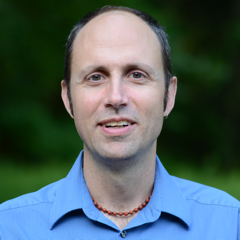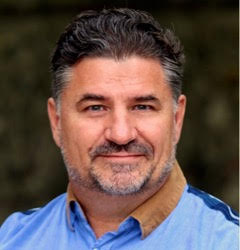Bill Baue and Robin Wood

Bill Baue
To achieve sustainability, we need to transcend the sustainability paradigm – a limiting mindset that (counter-intuitively) has only succeeded in solidifying unsustainability. We need to transcend and include sustainability by integrating it into a new meta-paradigm that spawns systems designed to thrive, sustainably. To get from here to there, integral leadership turns out to be a key that unlocks the conundrum of how to shift mindsets from wherever they are now (indeed, many leaders are stuck in pre-sustainability mind-frames), to a shared perspective focused on enabling us all to not only survive but also thrive.

Robin Wood
Here’s the problem in a nutshell: the sustainability movement has failed to produce sustainability; indeed, over its near half-century tenure, environmental, social and economic unsustainability have increased. For example, Earth Overshoot Day – when humanity’s Ecological Footprint outstrips our biocapacity to absorb our impacts and regenerate vital resources within a year – has crept forward from December 23, 1970 to August 13, 2015, an overdraft of an extra half-planet each year now. And income inequality and wealth gaps are widening, destabilizing our social foundations. And these are only two indicators of the great acceleration hurtling us into exponential decay.
Taking a cue from Donella Meadows’ seminal 1999 “Leverage Points: Places to Intervene in a System” essay: if we want systems that promote sustainability and thriving, we need to shift our mindsets – and thereby also the systems that those mindsets create – to project positive future pathways. Meadows two highest leverage points are:
- The mindset or paradigm out of which the system — its goals, structure, rules, delays, parameters — arises; and ultimately,
- The power to transcend paradigms.
The sustainability movement has generally focused all its attention on systems, without stepping back to consider the psychology and developmental maturity underpinning those systems. So, in order to transcend the sustainability paradigm (that is failing to achieve its namesake objective), we need a massive mindset shift, to envision a world where we respect our planetary boundaries – and our fellow humanity – as a foundation for thriving.
Enter ThriveAbility
This is precisely what the ThriveAbility Foundation (TAF) envisions. And we see the solution in building from the foundation of Integrated Thinking – which synthesizes the multiple capitals across the triple bottom line – to Integral Thinking, which takes a holistic yet stratified approach, by working with individuals and organizations where they’re at to inspire them to move towards where they can thrive.
In this way, ThriveAbility alchemizes the sustainability paradigm into an Integral paradigm. To support this agenda, TAF has been participating in a series of events that merge the Sustainability and Integral communities.
For example, in early October, TAF convened a Gathering (hosted by Ernst & Young at their Boston offices in the John Hancock Tower) that brought together sustainability pioneers, such as Global Reporting Initiative (GRI) Co-Founder and Global Initiative for Sustainability Ratings (GISR) Founder Allen White and Context-Based Sustainability (CBS) and MultiCapital Scorecard (MCS) Conceiver Mark McElroy, with pioneers of Integral Science such as Susanne Cook-Greuter, Maureen Metcalf, and Christopher & Sheila Cooke.
The Gathering came on the heels of momentum generated earlier in the week at the Sustainable Brands New Metrics Conference that compellingly capturing the double-edged sword of our global predicament: imminent doom if we continue down our current path, counter-balanced by unprecedented opportunity of paradigm-shifting toward ThriveAbility. (Prof. Yehuda Kahane of the YK Center pronounced TAF Founder Robin Wood’s Plenary Presentation followed by the Plenary Panel moderated by TAF Co-Founder Bill Baue to be an “Historic Moment” – while his colleague Tal Ronen more colorfully described it as a “WTF! Moment”).
With this as the backdrop, the ThriveAbility Gathering at EY featured TAF Co-Founders Wood, Baue, and Ralph Thurm presenting the core concepts of ThriveAbility – and more importantly, nurturing dialogue amongst the sustainability and integral leaders. Longtime TAF colleague Christopher Cooke described the event as a “watershed turning point” for ThriveAbility, for the first time truly fusing the systems transformation imperative of sustainability with the psychological transformation potential-tapping of integral approaches.
The day ended with Sheila Cooke posting a formula on the wall:
Consciousness (Ability to Handle Complexity)
—————————
(Complexity of) Life Conditions
This distillation has prompted the ThriveAbility Team to reformulate our ThriveAbility Calculus and Equation to express consciousness expansion and life condition complexity in tangible terms conveyed through the multiple capitals: social, human, natural, manufactured, financial, intellectual, and relational.
Throughout the fall, TAF curated a series of online ThinkTanks (or virtual dialogues) on Doughnut Sustainability Goals, Integral Thinking, and Cultural / Leadership Shifts. We engaged with hundreds of thought leaders across a wide variety of disciplines and institutions, in order to road-test our thinking, methods and tools, as well as to ensure we are building on what works in the field with partners that can helps us all scale what is working fast. TAF works with three kinds of partners:
- Alpha Partners are organizations that would like to pilot the ThriveAbility Program and understand how to generate True Future Value for their stakeholders;
- Delta Partners are consultants and agents of change and transformation keen to learn how to lead and facilitate aspects of the ThriveAbility Approach;
- Omega Partners provide strategic guidance and funding to the ThriveAbility Foundation.
In November, the ThriveAbility Team has been road-testing this new formulation at a series of events, including:
- The Integrated Thinking Symposiumin New York City on November 5, where Ralph presented the Keynote Address on Integral Thinking (and Bill also moderated a panel)
- The Reporting 3.0Conference in Berlin on November 13, where the TAF Team (Robin, Ralph, and Bill) hosted a workshop featuring Capital Institute Founder John Fullerton exploring its notion of Regenerative Capitalism as a means of applying a top-down ThriveAbility implementation at the economy-wide and bioregional level, and The Crown Estate’s Claudine Blamey considering how its Total Contribution accounting methodology could apply a bottom-up ThriveAbility implementation at the company level.
- A ThriveAbility MasterClass in London November 19 & 20 delivered by Robin and ThriveAbility Trustee Paul van Schaik along with Christopher Cooke to deliver a Masterclass geared particularly toward Delta Partners (i.e. consultants who implement the ThriveAbility Program).
The ThriveAbility MasterClass is designed to help participants develop provisional answers to 8 key questions that a ThriveAbility Pilot project addresses:
- What is the Current State of the System-in-Focus? (Normally the participant’s own organization and its key stakeholders, or a consultant’s client system)
- Where Does the System Need to Be?
- What is the Developmental Stage of the System?
- How Well is the System Being Led?
- What is the Potential of the System?
- What Measures Really Matter in the System?
- How Does Strategy in/for the System Need to be Different to Realize True Future Value?
- ThriveAbility Score – What is the Organization’s Fitness?
Future ThriveAbility MasterClasses are scheduled for:
- London – 20-21 January at the Psychosynthesis Trust in central London
- Netherlands – 15-16 February (dates and location TBC)
- Berlin – 18-19 February (dates and location TBC)
- Boston – 24-25 March (dates and location TBC).
As a Global Public Good, the ThriveAbility Foundation functions as an aggregator and accelerator of transformational change, fueled by the collective energy of our stakeholder ecosystem — so we welcome your engagement. Please plug in with us in one of the upcoming events, or reach out to join our partner network.
About the Authors
Bill Baue – Corporate Sustainability Architect
As an internationally recognized expert on ThriveAbility, Sustainability Context, and Online Stakeholder Engagement, Bill Baue designs systemic transformation at global, company, and community levels. A serial entrepreneur, he’s co-founded a number of companies and initiatives:
- ThriveAbility Foundation, which is designing a multi-capital operating system for a regenerative, inclusive global economy
- Sustainability Context Group, a global community of thought leaders and practitioners who advocate for Context-Based Sustainability;
- Convetit, an online stakeholder engagement platform;
- Sea Change Radio, a globally syndicated podcast on sustainability.
Baue has co-authored / -edited several books and reports, including:
- A Leader’s Guide to ThriveAbility (2015 ThriveAbility Foundation)
- Hairshirts, Rattlesnakes, and Shoelaces: Toward A Net Positive Movement (2015 Sustainable Brands & Convetit)
- Raising the Bar – Advancing Environmental Disclosure in Sustainability Reporting (2015 UNEP)
- Next Generation Sustainability Targets: Toward Big, Context-Based Goals (2014 Sustainable Brands)
- The Accountability Web: Weaving Corporate Accountability and Interactive Technology (2010 Harvard)
- Sustainability Progress to Date 2007–2008 (2007 First-ever Walmart Sustainability Report)
Baue has consulted with companies including Allstate, Cabot Creamery Cooperative,
GE, and Merck, among others. And he has worked with organizations across the sustainability ecosystem, including AccountAbility, Audubon, Ceres, Global Compact, UNCTAD, and Worldwatch Institute.
He teaches in the Marlboro Sustainability MBA, and serves on the Technical Advisory Group of the WWF / WRI / CDP / UNGC Science Based Targets initiative. He blogs for Guardian Sustainable Business and Sustainable Brands, where he also co-curates the #NewMetrics Channel.
He lives in a cohousing community in the Pioneer Valley of Western Massachusetts with his wife Jiyanna and daughters Clara, Emma, and Aoife.
Robin has lived and worked in 35 countries on 4 continents. Through his passion for transformation and healthy globalisation, he has helped a few hundred of the world’s largest organisations catalyze major beneficial change and transformation. His lifelong passion for Environmental and Social Justice means he’s been an activist for 40 years, including co-leading the campaign for Nelson Mandela’s release and the end of apartheid. 24 years ago he worked with the World Bank to develop the first sustainable energy strategy for the first Rio conference. 21 years ago he helped to create the modern Internet and what we now know as E-Business with the pioneering firms of Silicon Valley. He has founded several businesses both as an intrapreneur in Citicorp, Ernst and Young and NYNEX/Verizon, as well as entrepreneurial ventures such as Genesys, Telesure and Chateau La Tour Apollinaire. Robin has been advising business and political leaders at all levels including many well known CEO’s and prime ministers, as an integrally informed practitioner, social entrepreneur and integral leader. Since creating the Renaissance2 Foundation in 2008 at La Tour Apollinaire, his green Chateau in France, Robin co-founded the ThriveAbility Foundation in London with his world-class colleagues to help leaders make more ThriveAble decisions through the ThriveAbility Approach, Program and Index.
Robin is also the author of several books, including the award winning “Managing Complexity”, “The Great Shift”, “Lifeshift 2020”, “The Trouble with Paradise” and “A Leader’s Guide to ThriveAbility”. He earned a doctorate at London Business School for his work on the strategic alignment wheel, and holds degrees in economics, law and international finance, and qualified as an advocate of the Supreme Court of South Africa. For further information, please go to www.rlw.zone.
The ThriveAbility Foundation is a global public good designed to co-deliver a thriving, inclusive operating space for humanity within a regenerative footprint through a transformative, values-based approach to decision-making and governance at alls scales, from communities to organisations to nations to markets. Through integrated decision modelling of the seven capitals using the ThriveAbility Equations, leaders can align breakthrough strategies with stakeholder aspirations that deliver thriveable competitive advantage. Through the ThriveAbility Index, investors are able to select a portfolio with superior performance based on the innovation pathways and collaborations informed by the multi-stakeholder ThriveAbility program and True Future value calculations, using science-based goals. For further information, please go to www.thriveability.zone.
